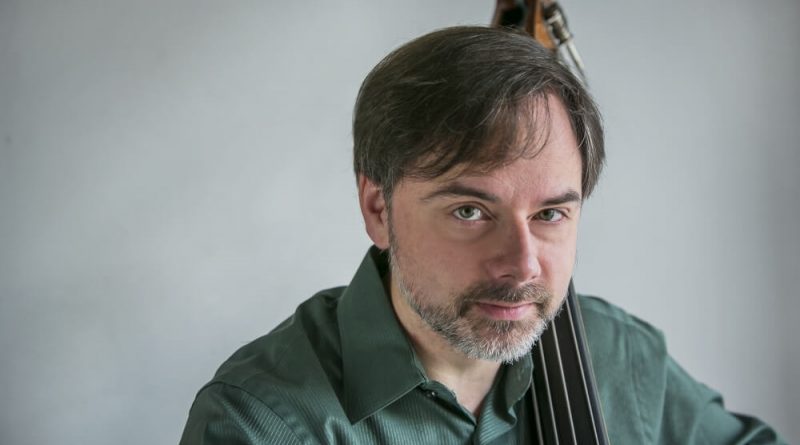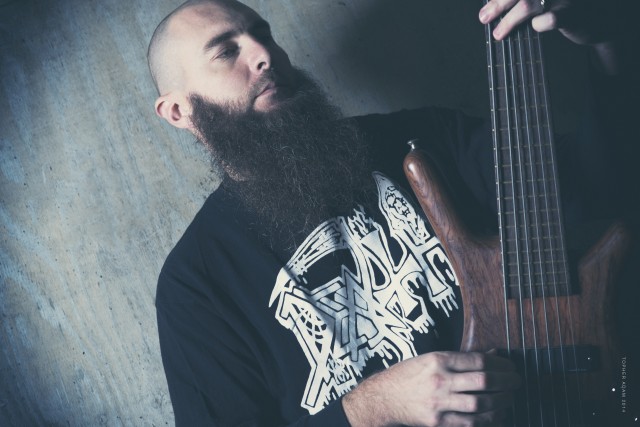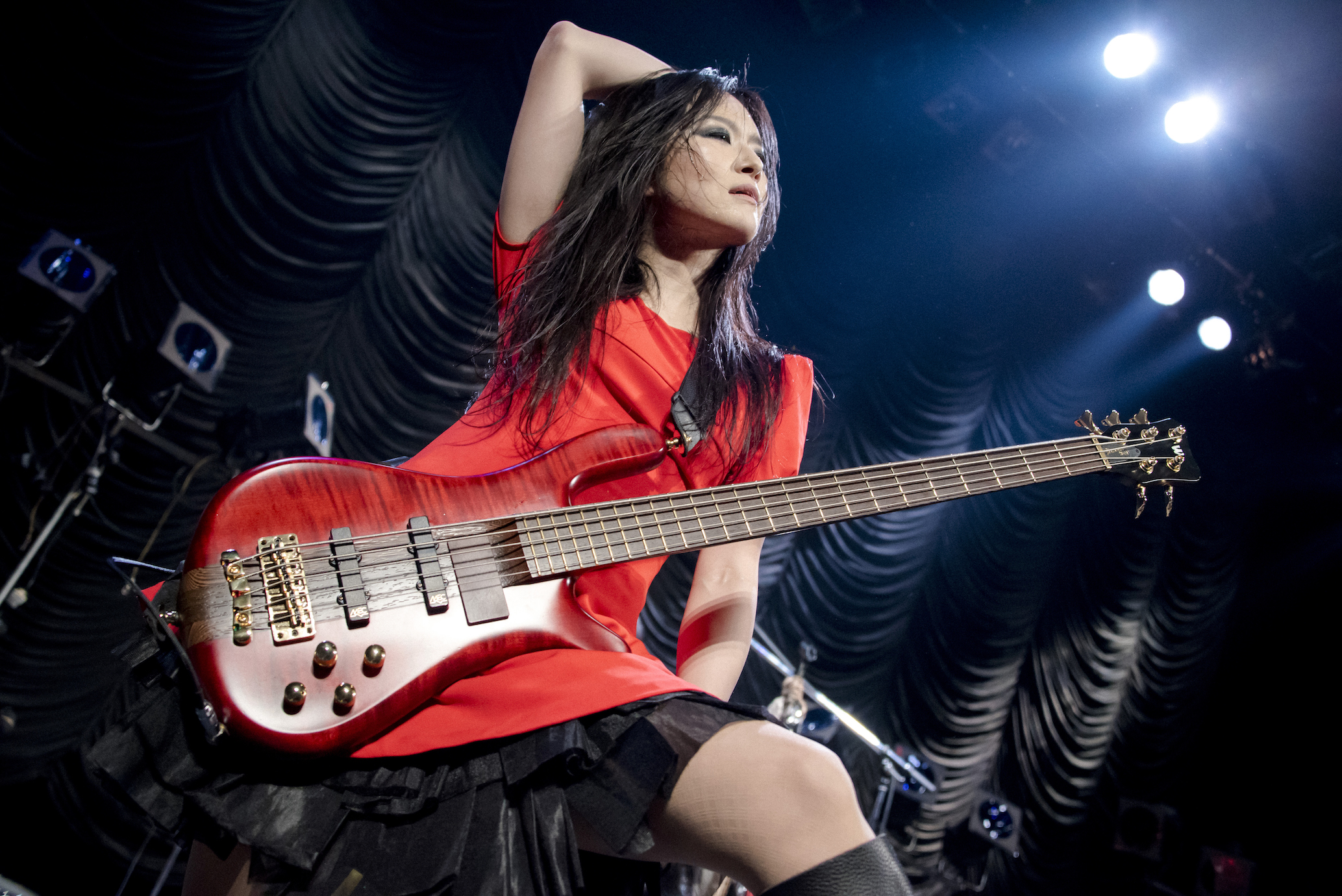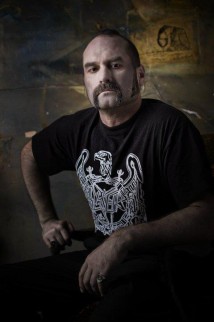Mark Wade – interview
Named one of the best bassists of the year for five of the last six years by Downbeat Magazine Reader’s Poll – Mark Wade, a contemporary jazz composer and bassist open to appreciating and contributing to great music in all its forms, talks to us about his latest album, „True Stories.” An album that has received wide critical acclaim, not only in the United States, but also throughout Europe.
At the beginning, tell us, please, how did it happen that you reached for the instrument? What age were you at the time and … was it immediately a double bass?
Mark Wade: I started my musical journey around the age of 14. I started out playing electric bass and not acoustic bass. Many of my friends at that time were starting to get interested in learning to play the guitar. I was late in joining that trend, so a number of my friends suggested that maybe I try playing bass instead. It was a random selection but I took to it immediately. I was self-taught almost up until the time that I went to college. I learned primarily through playing in bands and transcribing music from my favorite records. From the beginning I was serious about practicing on a regular basis.
Do you remember your first guitar? What model was it, what amplifier and strings did you use?
Mark Wade: I bought my first bass from a local music teacher who happened to have one that he was selling. I don’t remember what the original model was, however, Years later I had parts of that bass used to make a custom instrument for me that I still play to this day.
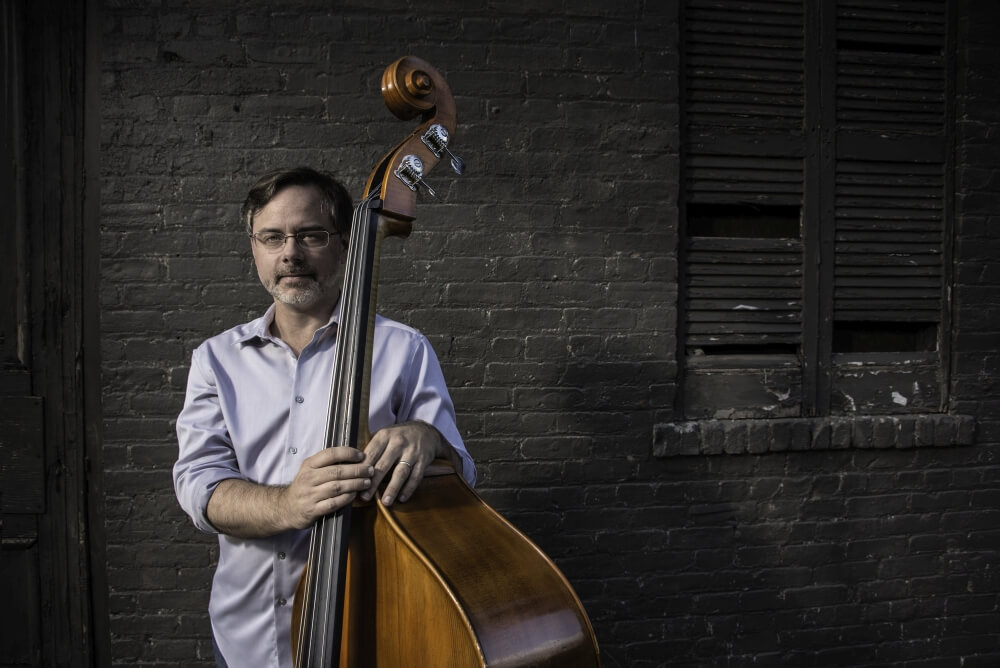
How was music school with you? Many jazz musicians complain about having their wings clipped and their individuality restricted by teachers; in your case, however, I suspect it was quite different? Wasn’t that where you developed a love for acoustic bass?
Mark Wade: I study music at New York University. My teacher was the great Mike Richmond who was playing with Miles Davis at the time. Mike was a huge positive influence on me in many ways. It was Mike who first suggested that I pick up the acoustic bass in addition to the Electric Bass just as he did. He was a great teacher who was very generous and sharing his considerable knowledge and talent with me over the four years I studied with him at the University and long after I left. Mike encouraged an individual voice in all his students which I think should be the norm for anyone teaching music.
And, in terms of musical genres – did you always know that jazz was exactly what you were meant for?
Mark Wade: When I started out on Electric Bass I was primarily playing rock music. I knew nothing of jazz at the time. I was always interested in finding out the influences of the bands that I was listening to. That process kept taking me farther and farther back on the musical timeline and eventually I started running into music that was related to jazz. That same curiosity led me deeper and deeper into the genre of jazz as I began to explore different artists and different sounds. That process continues to this day.
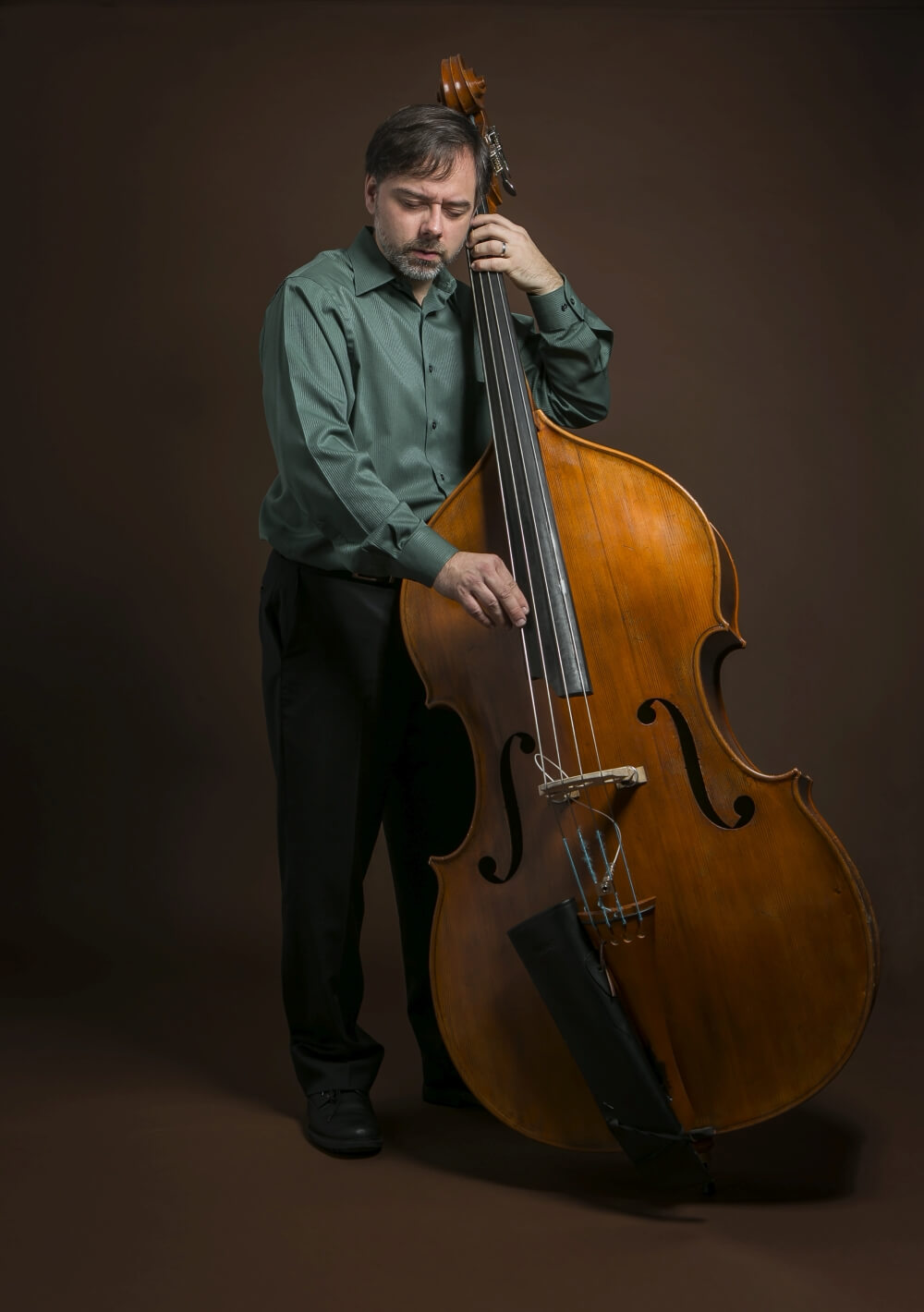
Your new album, „True Stories,” called „a living work of modern art” by Downbeat Magazine, is inspired by a wide range of influences. Tell us about your biggest influencers. What kind of music do you like to listen to yourself, when you are alone?
Mark Wade: There are a few major musical influences that I have turned to in the making of my new album. One of my biggest influences as a composer is the writing of Wayne Shorter. His work with the Miles Davis quintet in the 1960s and his subsequent solo records have made a lasting impact on me. Wayne’s sense of melody and harmony and his ability to write a captivating and engaging melody while still sounding modern and progressive is one of my favorite things about his music. It’s a style that I do my best to emulate in my own way. The inspiration for “True Stories” comes from a number of different sources such as the aforementioned Wayne Shorter, Charles Mingus, Igor Stravinsky, and a recently departed teacher from my time at New York University Frank Kimbrough. Left to my own devices, I listen to a combination of jazz and classical music, but I occasionally tune in to pop radio just to see what’s going on these days.
The album presents a high level of performance, but also at the same time contains a mix of contemporary or even futuristic solutions, which are fired at precisely the right places on the timeline of traditional jazz, showing your own creative vision of the development of improvised music. Tell us about the constructions of your pieces and your compositional process.
Mark Wade: I write music primarily at the keyboard. I almost never pick up my bass as part of the compositional process. I usually begin writing a tune by composing the main theme or melody that comprises the piece and then work on the harmony the best frames that idea. I’m always interested in creating interesting frameworks for the band to play over. There are no simple “lead sheets” for this album or for many of the songs on my previous records. I see these songs as not just a vehicle for improvisation but as musical statements in their own right. I try to balance concrete compositional statements with room for personal expression.
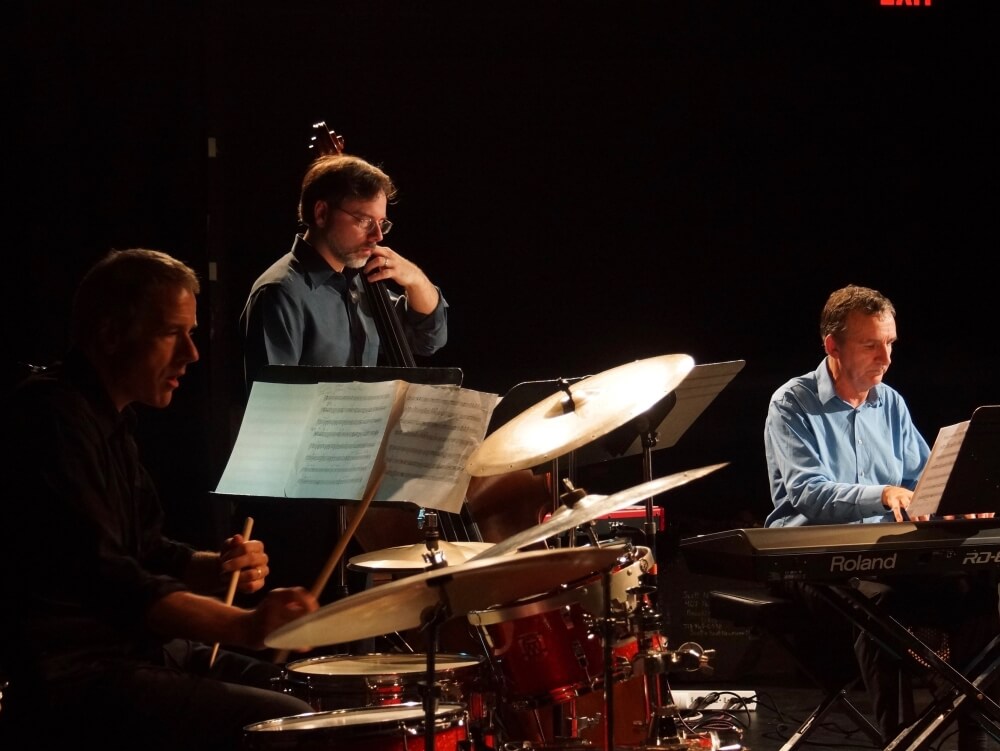
Who is part of your trio? Why did your choice fall on these musicians in particular?
Mark Wade: The trio is composed of Tim Harrison on Piano, my cell phone days, and Scott Neumann on drums. We have been playing together now as a trio for 10 years and that longevity has helped us to shape the music over the years. The three of us knew one another prior to my band through another band that we have been playing together in as sidemen. I knew from this experience that they would be excellent choices to form a band with.
Now let’s take a moment to talk about your earlier albums: in 2015 you published the album „Event Horizon” with your trio, three years later – its follow-up, „Moving Day.” On the other hand, in 2020, your solo visual album appeared, which features acoustic and electric bass and the whole range of sounds that these instruments can create. There are also music videos you recorded. How did you come up with this idea? Tell us about the circumstances of the creation of „Songs From Isolation.”
Mark Wade: My first two albums “Event Horizon” and “Moving Day” were both trio albums in the same vein as my current release. “Songs from Isolation” came about during the COVID-19 lockdown here in New York City in the spring of 2020. I was interested in learning some video editing skills in order to make better videos for my trio when the lockdown hit. I took that time to raise my skill level with video production. From that experience I made a series of five solo bass videos that I recorded from home during that lockdown. Videos were subsequently debuted at an online concert in South Africa and released worldwide on AMP Music and Records out of Oslo Norway.
Still staying with the instruments from the solo album – which one, the double bass or the bass guitar, is closer to you? With which do you prefer to express yourself?
Mark Wade: While I will always love playing the electric bass, about 85% of the work I do these days is on the acoustic bass either in jazz or classical music. That’s the bass I definitely find myself playing most of the time. That being said, both the electric and acoustic bass have their own voice and I love them both, even if I don’t spend an equal amount of time on them.
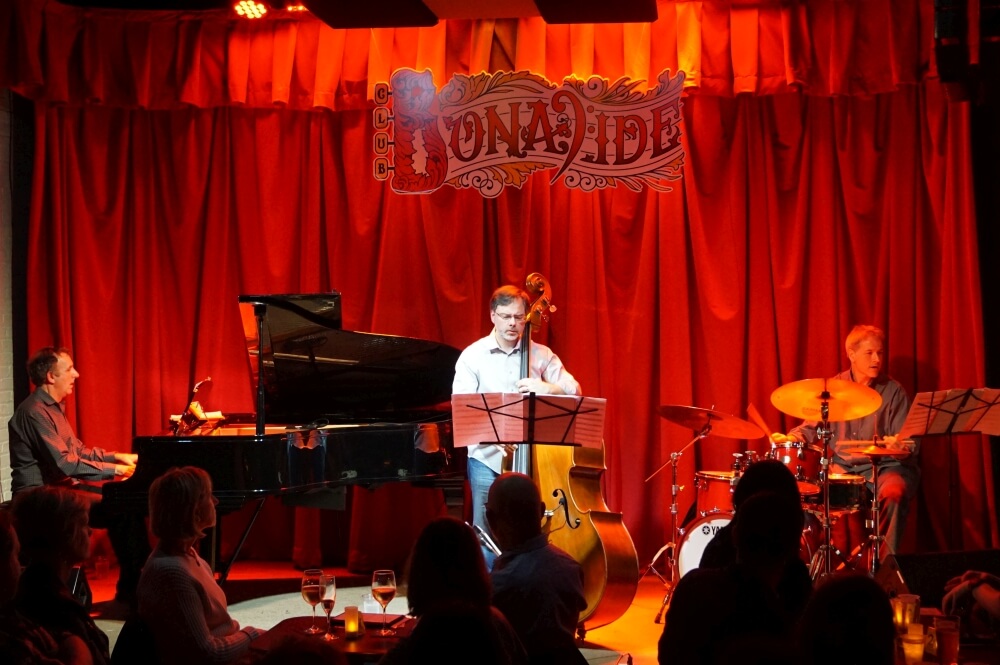
And what is your personal collection of guitars or double basses and – which one is your beloved instrument? Which strings and amplifiers do you use? Do you often use effects (which ones?)
Mark Wade: I have two custom electric bases that I have been playing for almost 30 years. They are the only electric bases I have ever had. Both are set up with D’Addario XL strings. They were the first strings I ever played and after trying many many different sets over the years I’ve always come back to those. have two acoustic bases – A large five string instrument that is set up to play classical music and a smaller more nimble instrument that I have set up to play jazz. Both are Czech basses. The five string bass is about 100 years old and my jazz bass is only about 15 years old. Living here in New York City means having a very portable amplifier set up to get around with. I have a first generation acoustic image head that I run through a custom cabinet I got from a friend of mine that is portable for life in the city. None of the work that I do calls for any kind of effects.
Also, reveal, please, what is your personal approach to solos – do you prefer to play them with an accompanying instrument or not?
Mark Wade: I like people to accompany for me when I solo the same way I would accompany them. There is a certain subset of bass players out there that prefer to solo without any accompaniment, but I am not one of them.
In New York, you’ve performed at Jazz at Lincoln Center, The Blue Note, The Iridium and Birdland, and you’ve also been an artist-in-residence at Flushing Town Hall and touring North America and Europe. You’ve also performed on top European stages, such as Lincoln Center and Carnegie Hall. What do you think unites and what separates the New York and European jazz scenes?
Mark Wade: Having had the good fortune of playing with people around the world it’s obvious to see that high caliber musicianship exists everywhere. In that regard, there is no difference between the New York and European jazz scenes. There is a difference in style between different regions but that is to be expected. I will say that the concentration and level of talent in such a small space as New York City is unlike anywhere else.
You are also the founder and director of New Music Horizons. Tell us about its goals and mission.
Mark Wade: New Music Horizons is a nonprofit organization that promotes the work of emerging mid-career composers in jazz and classical music. I have always played a lot of gigs that featured new music in both the jazz and classical genres. One of the reoccurring issues that I was seeing was that some venues were hesitant to book groups that were playing original music with the fears that audiences would not be responsive to music they were not already familiar with. New music horizons produces concerts that give artists a platform to talk about their Music directly with the audiences they perform for. I feel that extra layer of communication is helpful in gaining acceptance from new audiences for new music.
What are your concert plans for the coming weeks? As far as I know, in addition to jazz, you also give concerts in major classical music projects?
Mark Wade: As I write this, it is mid November. I have a number of gigs coming out for the holiday season both jazz and classical music as one might expect this time of year. I am also waiting on a potential trip to Saudi Arabia, fingers crossed. I will be coming to the UK in February 2023 for a week of concerts and master classes as well.
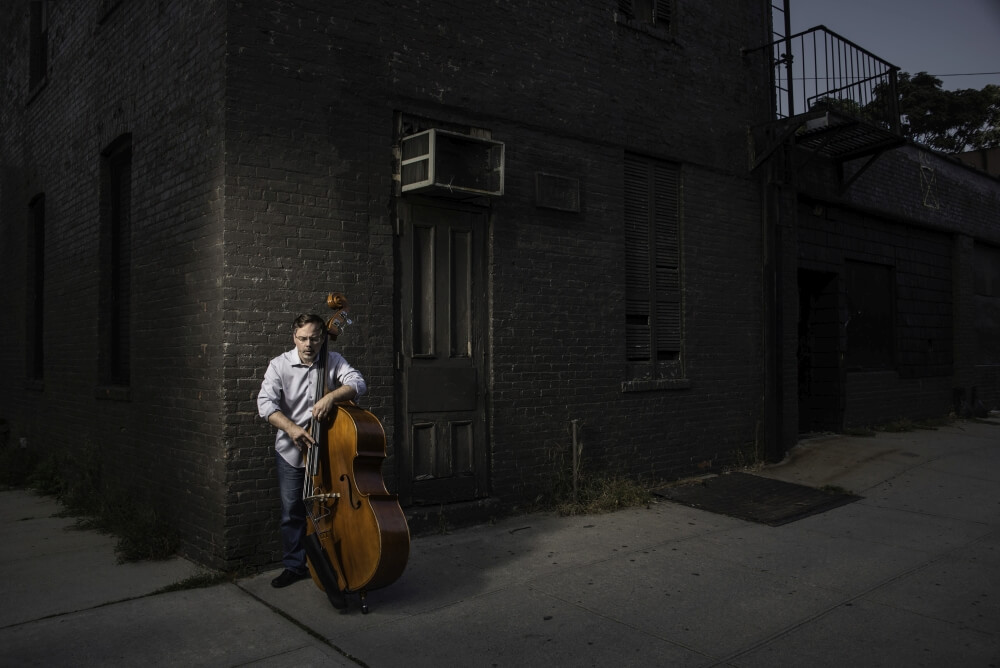
Knowing your pen as a composer, I am also deeply convinced that – even though we only celebrated the release of your trio’s wonderful album in March, probably another idea is preparing in your head or they are already creating new compositions?
Mark Wade: There are a number of projects on the horizon that I have my eye on. I have an entire album’s worth of music already written that primarily incorporates themes from modern classical music into jazz compositions for my trio. Some of this music has been written a while back, but I still have more I would like to put together for that. I have also started a writing project that includes a number of more simply constructed tunes as a contrast to the more complicated forms featured on my previous albums.
Thank you very much for the interview, hoping that soon our Polish enthusiasts of both jazz and good bass playing will be able to hear and see you live. And what are your dreams and plans?
Thank you so much for the interview. I certainly hope to bring my music to Poland one day. I am committed to continue to spread my music as far as I can take it.
website: https://www.markwademusicny.com/

